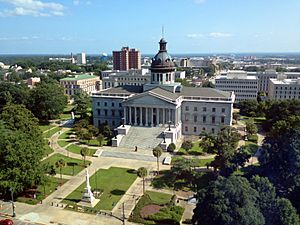Operation Lost Trust facts for kids
Operation Lost Trust was a big investigation by the FBI. The FBI is a special police force in the United States. This investigation looked into the South Carolina General Assembly from 1989 to 1999. The General Assembly is the group of lawmakers who create laws for the state of South Carolina.
By the end of the investigation, seventeen members of the South Carolina General Assembly were found to have broken rules. Operation Lost Trust is often seen as the biggest political problem in South Carolina's history. It led to important changes, like the Ethics Reform Act of 1991. It also helped change how the state government was set up in 1993.
What Happened After Operation Lost Trust?
New Rules: Ethics Reform Act of 1991
After Operation Lost Trust, state lawmakers created new rules. These rules were part of the Ethics Reform Act of 1991. This act made it against the rules for people called "lobbyists" to give gifts to government members. Lobbyists are people who try to influence lawmakers.
The new act also put a limit on how much money lobbying groups could give. Before, there was no limit. Now, they could only give up to $1,000. The act also made rules about how businesses could entertain lawmakers. This helped make sure everything was fair and open.
Giving More Power to the Governor
On February 23, 1993, a new plan was introduced to the South Carolina House of Representatives. This plan was about changing the state government. Before this, the governor of South Carolina had very little power. They were mostly a leader for show.
But after Operation Lost Trust, lawmakers voted to give the governor more power. The new plan combined many government groups into fewer, larger ones. It also let the governor choose and remove the leaders of many of these groups. Lawmakers still kept power over things like schools and roads. However, the governor gained power over agencies that handled healthcare and collected taxes. Even with these changes, the General Assembly still has a lot of power in South Carolina.
 | Jackie Robinson |
 | Jack Johnson |
 | Althea Gibson |
 | Arthur Ashe |
 | Muhammad Ali |


